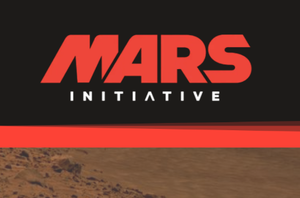Mars Initiative

The Mars Initiative is a 501.c.3. non-profit organization based in Houston, Texas, founded in 2011 by Mina Mukhar and Chris Bellant to inspire and accelerate a human landing on Mars through individual donations from around the world[2][3]. The main goal of the organization is to get humans to Mars faster via the Mars Prize Fund, a crowdfunded Prize intended to offset some of the cost of sending the first human crew to the Martian surface[4]. The Mars Initiative also crowdfunds two grant programs, the Micro-G Education Grant and the newly formed Space Innovation Grant[5][6].
The Goals of the Mars Initiative are:
- To accelerate humanity becoming an interplanetary species.
- To give everyone on Earth the chance to participate in humanity’s first steps onto a new planet.
- To educate and inspire the generation that will first explore Mars in person.
- To fund the innovators of today, creating the necessary technologies for the explorers of tomorrow.
The Mars Prize Fund
The Mars Prize Fund is the longest running Mars Initiative fund, started in 2011. It is an incentive intended to accelerate the “New Space Race”, to be awarded to the organization that first lands a human safely on Mars. The Mars Prize Fund is open to any and all contributors, and recently began accepting cryptocurrencies.
A “Mars Mile” is the estimated mission cost ($30 billion) divided by the approximate distance to Mars (300 million miles), or $100 per “Mars Mile”. Any individual or corporation who achieves a “Mars Mile” is acknowledged for their contribution. As of April 2, 2021, the Mars Prize fund is worth more than $23,000, with donations from individuals spanning 40 different countries, and an upward growth trajectory.
The Micro-G Fund
Established in 2017, the Education Micro Grant (Micro-G) Fund awards up to $200 to educators to further the teaching of space related lessons in their classrooms. Some of the first Micro-G grants awarded were used to purchase Ardusat Space Kits, a SunSpotter telescope, and materials for NASA’s ANGLeS Challenge. As of March 2021 the Education Micro-G program has awarded 10 grants, reaching over 450 students throughout the United States. The Mars Initiative is working to expand this grant to international educators in 2021.
The Space Innovation Grant
The Space Innovation Grant is a grant for Mars and space-related start-ups, small companies, and other small space related groups. The Mars Initiative is currently supporting 3 space sector start up companies: Neutron Star Systems, Stellar Amenities, and Project Helios[7][8][9]. The intent of the grant is to ensure these companies can keep innovating without having to worry about a lack of funding.
- ↑ https://marsinitiative.org/
- ↑ https://www.satellitetoday.com/podcast/2020/09/14/to-mars-and-beyond-with-chris-bellant-of-the-mars-initiative/
- ↑ https://www.houstonchronicle.com/news/houston-texas/space/article/Pearland-nonprofit-s-pitch-100-equals-one-15750321.php
- ↑ https://marsinitiative.org/the-mars-prize-fund/
- ↑ https://marsinitiative.org/mars-microgrants/
- ↑ https://marsinitiative.org/sig/
- ↑ https://www.neutronstar.systems/
- ↑ https://www.stellaramenities.space/
- ↑ https://project-helios.space/






